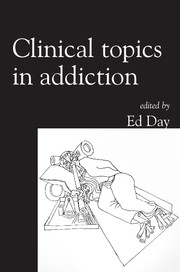Book contents
- Frontmatter
- Contents
- List of tables
- List of boxes
- List of figures
- List of contributors
- Foreword by Nat Wright
- Preface
- 1 What works in drug addiction?
- 2 The development of the drug treatment system in England
- 3 Stimulant use still going strong
- 4 Adverse effects of khat: a review
- 5 What the clinician needs to know about magic mushrooms
- 6 What works in alcohol use disorders?
- 7 Management of alcohol detoxification
- 8 Nicotine addiction and smoking cessation treatments
- 9 Pathological gambling: an overview of assessment and treatment
- 10 Use of investigations in the diagnosis and management of alcohol use disorders
- 11 Laboratory investigations for assessment and management of drug problems
- 12 Pharmacotherapy in dual diagnosis
- 13 Dual diagnosis: management within a psychosocial context
- 14 Treating depression complicated by substance misuse
- 15 Treating anxiety complicated by substance misuse
- 16 An overview of psychological interventions for addictive behaviours
- 17 Motivational interviewing
- 18 Substance misuse in adolescents
- 19 Management of drug misuse in pregnancy
- 20 Intoxication and legal defences
- 21 Substance misuse and violence: the scope and limitations of forensic psychiatry's role
- 22 Literary and biographical perspectives on substance use
- Index
14 - Treating depression complicated by substance misuse
Published online by Cambridge University Press: 02 January 2018
- Frontmatter
- Contents
- List of tables
- List of boxes
- List of figures
- List of contributors
- Foreword by Nat Wright
- Preface
- 1 What works in drug addiction?
- 2 The development of the drug treatment system in England
- 3 Stimulant use still going strong
- 4 Adverse effects of khat: a review
- 5 What the clinician needs to know about magic mushrooms
- 6 What works in alcohol use disorders?
- 7 Management of alcohol detoxification
- 8 Nicotine addiction and smoking cessation treatments
- 9 Pathological gambling: an overview of assessment and treatment
- 10 Use of investigations in the diagnosis and management of alcohol use disorders
- 11 Laboratory investigations for assessment and management of drug problems
- 12 Pharmacotherapy in dual diagnosis
- 13 Dual diagnosis: management within a psychosocial context
- 14 Treating depression complicated by substance misuse
- 15 Treating anxiety complicated by substance misuse
- 16 An overview of psychological interventions for addictive behaviours
- 17 Motivational interviewing
- 18 Substance misuse in adolescents
- 19 Management of drug misuse in pregnancy
- 20 Intoxication and legal defences
- 21 Substance misuse and violence: the scope and limitations of forensic psychiatry's role
- 22 Literary and biographical perspectives on substance use
- Index
Summary
Summary Dependence on alcohol or other drugs is a depressing experience. The way of life of a person dependent on alcohol is replete with incidents that are demoralising, waking daily with a hangover or with tremor and retching, coupled with amnesia for events of the night before, a sense of inability to face the day ahead and awareness of recriminations at work and at home. Little wonder that depressed mood is common in such circumstances. Similarly, in drug addiction, when life is dominated by the daily problem of obtaining supplies of a substance that brings transient relief or pleasure but also an impoverished existence and low mood. Add to this the fact that the biological action of many commonly misused substances can induce depression, then it is hardly surprising that depression is common in this population. A smaller number use alcohol or illicit drugs to cope with primary depression. Teasing out the interplay of affect and substance misuse is a challenge for the general psychiatrist and the addiction specialist.
As many as 80% of alcoholics experience depressive symptoms, including 30% who fulfil criteria for a major depressive disorder (Raimo & Schuckit, 1998). A lifetime history of depressive disorder has been found in 48% of opiate addicts (Rounsaville et al, 2001). Thus, it is clear that substance misuse and depressive symptoms often occur together, but what is less clear is their true relationship. Box 14.1 shows three frequently asked questions concerning it.
The combination of depressive symptoms and substance misuse presents important management issues, both at the level of the individual patient and regarding service provision. In individual patients it is often difficult to disentangle all threads of the presentation. An unusual mental state may be due to intoxication, and substance misuse may be hidden. A frequent management dilemma is the intoxicated patient in the middle of the night, who has self-harmed, or is threatening to do so.
Although depressive symptoms and substance misuse commonly occur together, services for their joint management do so less frequently; one editorial talks of the ‘medical model of psychiatric services […] contrasting sharply with the psychosocial orientation of substance misuse services’ (Weaver et al, 1999).
- Type
- Chapter
- Information
- Clinical Topics in Addiction , pp. 184 - 195Publisher: Royal College of PsychiatristsPrint publication year: 2007



